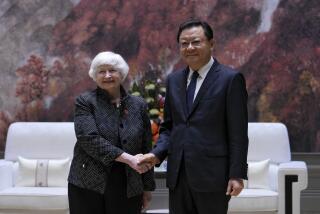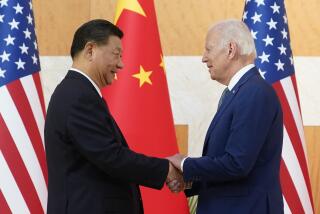First Lady Again Sounds Themes for Women’s Rights
- Share via
SHANGHAI — At a restored synagogue here, she admired a Torah to highlight American support for freedom of religion in China. At a medical center in Beijing, she applauded Chinese research on spina bifida and other birth defects.
And in this city’s modern library Wednesday, she played on the popular aphorism that “women hold up half the sky,” taking aim at China’s practices of forced abortion and sterilization to limit family size.
“Women can’t hold up half the sky,” declared Hillary Rodham Clinton, “if they are denied the freedom to plan their own families.”
A world away from the embarrassments of the investigation into Monica Lewinsky’s alleged relationship with her husband or even lingering fallout from the Paula Jones sexual harassment case, the first lady is conducting a China trip of her own. It is much lower key than that of the president, with whom she has appeared across China, typically taking the background role expected of a leader’s spouse.
Yet Mrs. Clinton also has managed to fit in a round of her own appearances, often reflecting her cherished themes of women’s rights, children’s well-being and health care.
At these local gatherings, she has heard Chinese women speak candidly about abusive husbands, exploitative employers, housing woes of divorcees and the need for education in China’s increasingly unregulated economy.
In a village near the Chinese city of Xian, a professor told her that some families now sell their donkeys so their daughters can afford college tuition. Mrs. Clinton later lamented at another appearance that many able young women “may not have a family to sell a donkey” to pay for their schooling.
In sub-Saharan Africa, the former Soviet Union, Eastern Europe, northern Thailand, the Philippines and the Andes Mountains of South America, this first lady has made a practice of seeking out those sorts of conversations, always in the hope of gleaning a little bit of insight that might be put to wider use.
“She’s always gone out of her way to meet with women and girls,” Melanne Verveer, the first lady’s chief of staff, said as Mrs. Clinton, with daughter Chelsea and Secretary of State Madeleine Albright, observed exhibits in the old synagogue. “What she’s often said,” Verveer continued, “is that we face common challenges.”
Sometimes she is the one facing challenges--to make the best of a situation engineered by well-meaning foreign hosts. In a stifling, overcrowded legal conference room in Beijing, where microphones were spewing out ear-splitting feedback, Mrs. Clinton settled into the chair reserved in her honor--the biggest and cushiest--only to sink and sink until she sat half a head lower than everyone around her.
Still, she remained composed and kept the conversation moving, earnestly asking one participant for examples of “major important cases” that the legal center has handled. At another point, she wanted to know how a client had “found her way to the center to seek legal assistance.”
If Americans are divided in their views of the first lady, the Chinese have mixed feelings too. While often speaking of her in admiring tones, in random interviews some also seemed taken aback by her unabashedly modern style.
“She is very able, very aggressive as a lawyer,” said a woman in her late 20s who identified herself as Miss Tang. “She is totally unlike any of the Chinese leaders’ wives.”
A career woman in her mid-40s, who, like many in this nation unaccustomed to freedom of expression, declined to provide any name, observed of Mrs. Clinton: “She is a lawyer and a politician. She may be a good partner, but I don’t know if she is a good wife and mother. For most of the people, it is very hard to make a balance.”
While the president’s movements require a huge motorcade and bring a retinue of staffers and press that can impart a circus-like atmosphere to events, Mrs. Clinton can maneuver a bit more easily, accompanied typically by just a few staffers.
In China, her appearances have included participating in a round-table at Beijing University, meeting with physicians from the Beijing Medical Center and the U.S. Centers for Disease Control and Prevention, as well as visiting a girls school and retraining center in Shanghai.
It was in Beijing in 1995, at the United Nations Fourth World Conference on Women, that she delivered a well-received speech, replete with implied criticism of the Beijing regime for its policies of forced abortion.
That appearance made a big impression on Mrs. Clinton and her close aides. “While we spoke different languages and came from different places, we shared a universal belief--that women’s rights are human rights and that human rights are women’s rights,” Mrs. Clinton on Wednesday recalled of the U.N. conference.
In her remarks at the Shanghai library, which aides had described in some ways as a sequel to the 1995 address, Mrs. Clinton said that progress for society depends broadly on women “having equal access to life’s tools of opportunity” such as medical care, education, employment and legal rights. “Only when we create a world where every citizen enjoys fundamental freedoms and every child is valued and given equal opportunities--then, and only then, will we be able to say with honesty, ‘Yes, women hold up half the sky.’ ”
Times staff writers Maggie Farley and Tyler Marshall contributed to this report.
More to Read
Sign up for Essential California
The most important California stories and recommendations in your inbox every morning.
You may occasionally receive promotional content from the Los Angeles Times.













